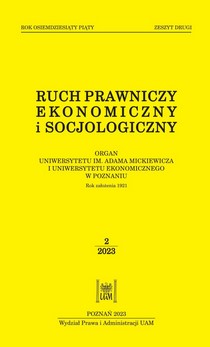CONVENTIONAL ACTS AND THEIR NORMATIVE CONSEQUENCES: CONTROVERSIES OVER THE POZNAŃ CONCEPT OF CONVENTIONAL ACTS
CONVENTIONAL ACTS AND THEIR NORMATIVE CONSEQUENCES: CONTROVERSIES OVER THE POZNAŃ CONCEPT OF CONVENTIONAL ACTS
Author(s): Mikołaj HermannSubject(s): Constitutional Law, Philosophy of Law
Published by: Uniwersytet im. Adama Mickiewicza w Poznaniu
Keywords: conventional act; constitutive rule; normative consequence of a conventional act; outcome of a conventional act; legal norm; competence norm; competence;
Summary/Abstract: The concept of conventional acts is one of the foremost achievements of the Poznań School of Legal Theory. The aim of this paper is to resolve doubts concerning the relationships between constitutive rules and norms of conduct, whereby the norms bear on conventional acts in a twofold manner. On the one hand, they may regulate the performance of such acts and, on the other, attach normative consequences to a performed act, as a result of which the normative situation of certain entities changes. Focusing on the latter aspect, it was necessary to compile a catalogue of possible normative consequences and to decide whether such consequences are prerequisite if an act is to be qualified as conventional. The analysis warrants the conclusion that the existence of a conventional act does not depend on whether it entails normative consequences. The correlation between a conventional act and its normative consequences is not necessary, but merely functional, although its strength may vary. Also, it is likely that the confusion in this regard stems from the failure to distinguish between two types of effects which the acts in question produce, assuming that certain effects do in fact ensue. Specifically, one has to distinguish between an effect understood as the outcome of a conventional act and an effect understood as its normative consequence. It is presumed here that the effect of a conventional act is distinguished by a relevant constitutive rule, while any normative consequences following its performance should be approached only as a corollary of competence norms. Assuming that the relationship between constitutive rules and norms of conduct is functional enables the rules to be recognized as independent with respect to the norms. Furthermore, it also implies the need for two concepts of competence to be distinguished, namely conventional competence and normative competence.
Journal: Ruch Prawniczy, Ekonomiczny i Socjologiczny
- Issue Year: 85/2023
- Issue No: 2
- Page Range: 73-88
- Page Count: 16
- Language: English

